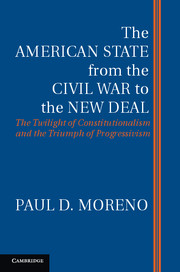 The American State from the Civil War to the New Deal
The American State from the Civil War to the New Deal Book contents
- Frontmatter
- Contents
- Abbreviations Used in the Footnotes
- Acknowledgments
- Introduction
- Part I The Old Regime
- Part II Early Progressivism
- Part III Late Progressivism
- 11 Wilsonian Progressivism
- 12 The New Freedom
- 13 The New Wilson
- 14 The Great War
- 15 The Return of the Regular Republicans
- 16 The Taft Court
- 17 The Last Progressive
- Part IV The New Deal
- Appendix A
- Appendix B
- Primary Sources
- Index
- References
15 - The Return of the Regular Republicans
Published online by Cambridge University Press: 05 May 2013
- Frontmatter
- Contents
- Abbreviations Used in the Footnotes
- Acknowledgments
- Introduction
- Part I The Old Regime
- Part II Early Progressivism
- Part III Late Progressivism
- 11 Wilsonian Progressivism
- 12 The New Freedom
- 13 The New Wilson
- 14 The Great War
- 15 The Return of the Regular Republicans
- 16 The Taft Court
- 17 The Last Progressive
- Part IV The New Deal
- Appendix A
- Appendix B
- Primary Sources
- Index
- References
Summary
HARDING AND COOLIDGE
The return of the “regular” Republicans to full control of the federal government in 1921 slowed progressive reform, and many wartime programs were scaled back. The Republicans finally declared the war over in 1921, thus ending the basis for such legislation as the Lever Act. The Republicans enacted no peacetime Sedition Act, and President Harding pardoned most of those convicted under the wartime Act. Postal censorship had continued into 1921, but the new Postmaster General ended it and reaffirmed the principle of liberty. Congress reduced taxes and spending dramatically, though rates and revenues did not return to pre-war levels, and nobody seriously considered doing away with the income tax altogether. Similarly, the Federal Reserve Board remained in place. The Federal Trade Commission survived the decade, maintaining a progressive-Democratic majority until 1925. In reaction to its hostile report on the meatpackers, Congress gave power to regulate that industry to the Department of Agriculture in the Packers and Stockyards Act of 1922. The Supreme Court also reined in the commission, holding that it could not impose its own definition of “unfair methods of competition,” and allowing courts to review its factual findings. In 1925, with the appointment of the outspoken William E. Humphrey, Republicans won a majority on the five-man commission. It now began to restrain itself, particularly by ending the practice of “fishing expeditions” – sweeping investigations without a particular allegation of wrongdoing. Senate progressives were so dissatisfied that the commission had failed to expose a nefarious electric “power trust” in 1927 that they began an investigation of their own. Several progressives called for the repeal of the FTC Act.
- Type
- Chapter
- Information
- The American State from the Civil War to the New DealThe Twilight of Constitutionalism and the Triumph of Progressivism, pp. 177 - 188Publisher: Cambridge University PressPrint publication year: 2013


